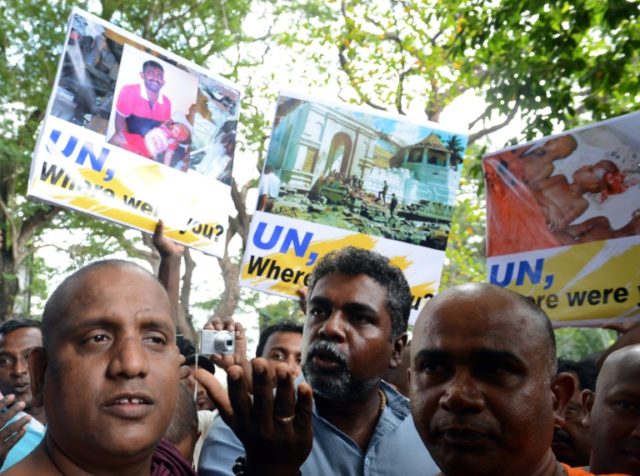Colombo (AFP) – UN chief Ban Ki-moon Thursday called on Sri Lanka to embrace reconciliation and unity seven years after the end of its decades-long civil war that claimed over 100,000 lives.
Ban told a meeting in the port city of Galle, the capital of the majority Sinhalese heartland of the southern province, that the country must pursue lasting peace.
“Please continue to prove that Sri Lanka is emerging from decades of adversity, suspicion and divisiveness,” he said at a gathering of young Sri Lankans.
The secretary general urged the audience to lead the way towards “rebuilding, reconciliation and an appreciation of diversity in unity”.
Ban is on his second visit to the island since the war ended in 2009 when he secured a pledge from the then ruling president Mahinda Rajapakse to resettle 300,000 displaced civilians and ensure accountability for war crimes.
However, the former government went back on its pledge and faced international censure, including from the UN, over its human rights record.
President Maithripala Sirisena, a member of the majority Sinhalese community, came to power in January last year on a promise to ensure reconciliation and punish those found guilty of excesses during the war.
– Nationalists protest –
Earlier Thursday, dozens of Sri Lankan nationalists rallied outside the United Nations compound in Colombo, protesting against the UN’s actions during the prolonged ethnic war.
Police held back the demonstrators led by Buddhist monks as they tried to march on the compound just before Ban arrived there to meet with Colombo-based staff.
“UN, where were you?” said one placard, which carried a photograph of a victim of a bombing blamed on Tamil Tiger rebels who were crushed by security forces in May 2009.
The protesting ultra-nationalists accuse the UN of siding with Tamil rebels while hardliners in the Tamil community also criticise it for failing to protect civilians during Sri Lanka’s 37-year war.
“The UN was silent when Tiger terrorists were bombing and massacring our people,” Buddhist monk Akmeemana Dayaratne said as protesters handed over a petition to the UN office to be given to Ban.
“Now the UN is asking for investigations to punish us for defeating terrorism,” he told AFP, referring to the UN’s call for the island to probe war crimes committed during the conflict.
A police official outside the UN offices, located in a tightly guarded area of the capital, said officers had obtained a court order preventing protests to avoid breaches of the peace.
“We did that because we feared that any protest could lead to unrest,” he said, requesting anonymity.
Ban’s convoy arrived at the compound shortly after the protesters had been peacefully dispersed.
The UN leader met with Prime Minister Ranil Wickremesinghe on Wednesday evening after arriving in Sri Lanka from Myanmar, and went in for closed-door talks with President Sirisena on Thursday evening.
He is also due to deliver a public lecture on peace and development and travel to the war-battered northern Tamil heartland of Jaffna, before leaving on Friday.
Sri Lankan diplomats said they were keen to showcase the new government’s reconciliation efforts and reconstruction in Tamil areas following the civil war that claimed at least 100,000 lives between 1972 and 2009.
The UN has been pushing for a special court to investigate allegations that up to 40,000 Tamil civilians were killed by government forces in the final months of fighting.

COMMENTS
Please let us know if you're having issues with commenting.